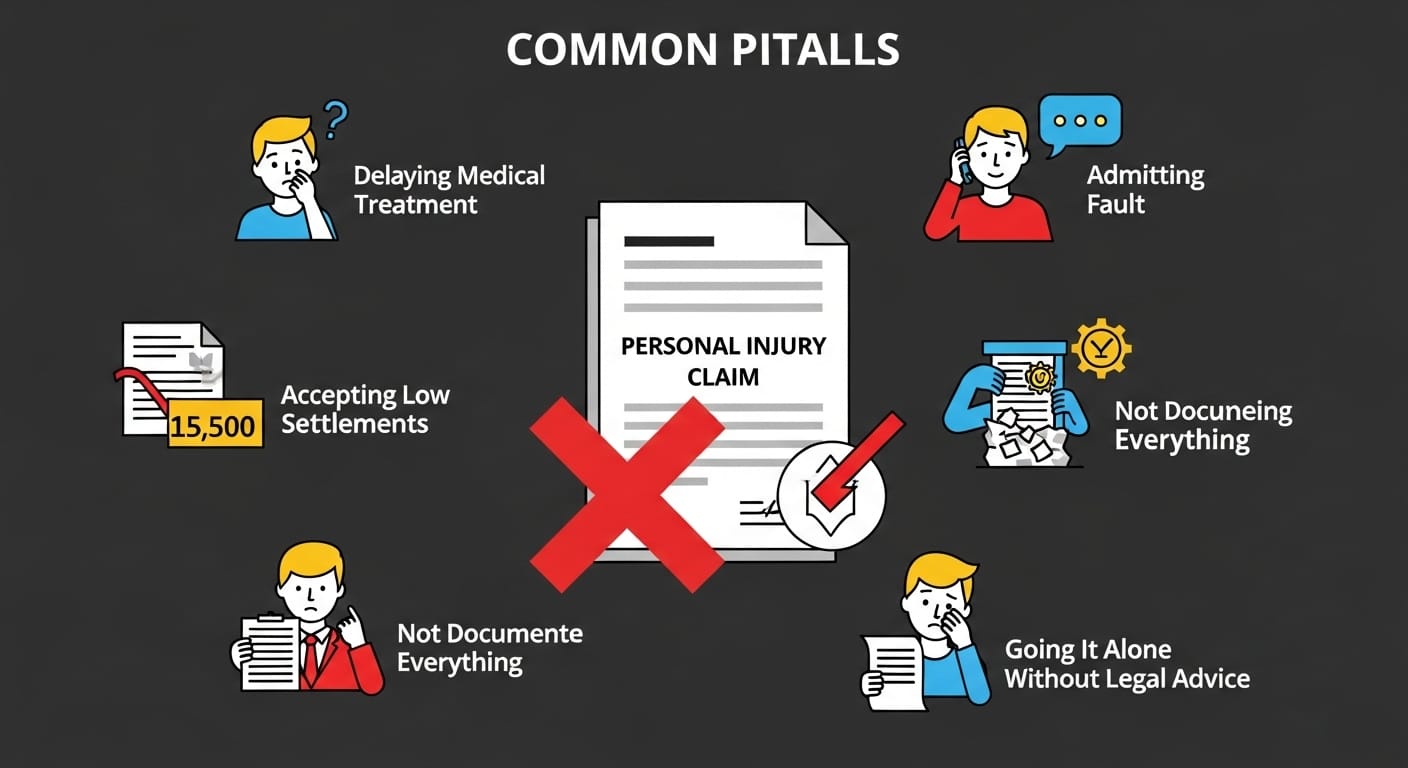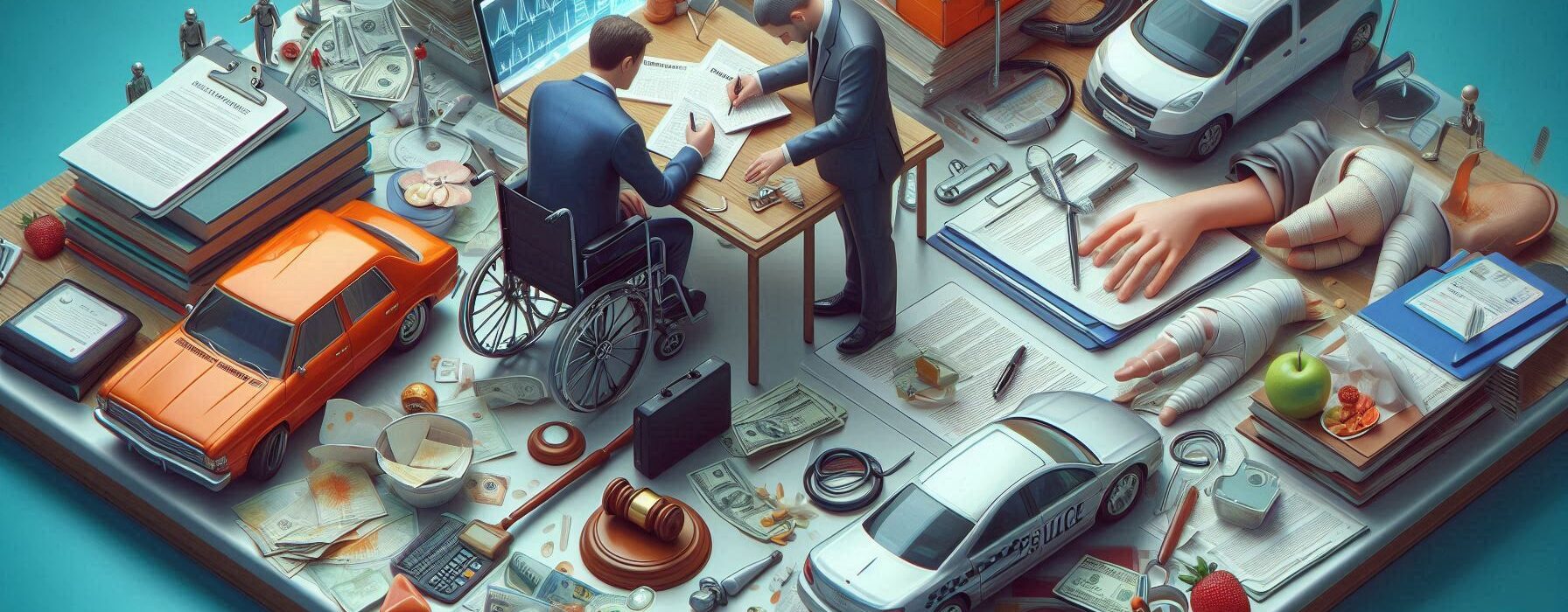Filing a personal injury claim can feel like wandering through a legal minefield while blindfolded. One wrong move, and you’re metaphorically stepping on something explosive—like losing out on thousands of dollars or unintentionally incriminating yourself.
To make matters worse, insurance companies are sitting in their offices rubbing their hands together like villains in a Saturday morning cartoon, just waiting for you to mess up.
But don’t worry! I’m here to guide you through the most common mistakes, with a few chuckles along the way, because nothing says “fun” like talking about lawsuits.

Top Takeaways and Key Concepts
Seek immediate medical treatment to document injuries and strengthen your claim.
Limit communication with insurance adjusters and avoid recorded statements without legal advice.
Avoid posting on social media during a claim to prevent evidence against you.
Keep detailed records of medical bills, accident photos, receipts, and related expenses.
Hire an attorney to navigate the claim process, maximize compensation, and meet deadlines.
Summary of This Article
Please Note: This post may contain affiliate links. If you click one of them, we may receive a commission at no extra cost to you. As an Amazon Associate, I earn from qualifying purchases.
The article outlines common mistakes to avoid when filing a personal injury claim. Key pitfalls include delaying medical treatment, oversharing with insurance adjusters, and posting on social media, all of which can weaken your case. It emphasizes the importance of maintaining detailed records, understanding the full value of your claim, and consulting an attorney to handle negotiations, deadlines, and legal complexities. By avoiding these errors and staying organized, claimants increase their chances of receiving fair compensation for their injuries.
1. Delaying Medical Treatment: “I’ll Walk It Off” Said No Doctor Ever

One of the worst mistakes you can make is skipping medical treatment after your injury. I get it—you think you’re tough, or maybe you’re worried about the cost. But here’s the thing: if you don’t see a doctor, your claim might as well be written in invisible ink.
Insurance adjusters love to see gaps in medical treatment. To them, it’s a golden opportunity to argue that you weren’t really hurt. Even if you’re only feeling a mild ache, get checked out. Injuries like whiplash or concussions can sneak up on you like a bad plot twist in a movie. By the time you notice, the adjuster’s already throwing shade on your claim.
To be fair, it’s not just about the claim. Your health matters too. The sooner you get treated, the faster you can recover—and the better evidence you’ll have when it’s time to battle the insurance company.
2. Talking Too Much: The Silent Treatment Is Underrated

Insurance adjusters are not your friends. Sure, they’ll call you sounding all polite, asking how you’re doing, but make no mistake: they’re fishing for ways to undermine your claim. If you’re the chatty type, this is where you need to learn the fine art of zipping your lips.
One wrong word—like saying, “I feel fine”—can be twisted faster than a pretzel. Even if you’re just being polite, it could be used as evidence that your injuries aren’t serious. Pro tip: keep your conversations limited to the basics, like confirming your contact info. When in doubt, say, “Talk to my attorney.”
Oh, and never, ever agree to a recorded statement without legal advice. It’s like giving them a personal highlight reel of everything they can use against you.
3. Posting on Social Media: The Court of Facebook Is Ruthless

You might think it’s harmless to post a picture of yourself smiling at your cousin’s barbecue two weeks after your accident. But trust me, an insurance adjuster sees that photo and thinks, “Ah, Exhibit A!” Suddenly, your happy snapshot is “proof” you weren’t hurt, even if you were wincing in pain between bites of potato salad.
The safest bet? Go full incognito on social media during your claim. No posts, no comments, no check-ins. If you can’t resist the siren song of social media, at least set your accounts to private and avoid posting anything remotely active. Even your heartfelt review of a new yoga class could backfire.
4. Settling Too Quickly: Patience Is a Virtue (and a Bigger Check)
After an accident, the insurance company might dangle a settlement offer in front of you faster than a waiter brings the breadbasket. It’s tempting, especially if you’re staring down medical bills like they’re a mob boss demanding payment. But here’s the catch: their first offer is almost always a lowball.
Take your time. Let your injuries heal, and make sure you fully understand the extent of your damages before agreeing to anything. Settling early might leave you footing the bill for future medical treatments or lost wages. Besides, once you accept a settlement, there’s no going back for seconds.
5. Not Keeping Records: Paper Trails Are Your Best Friend
If you’re the type to shove receipts into the nearest junk drawer, now’s the time to change your ways. In a personal injury claim, documentation is king. Medical bills, receipts for prescriptions, even mileage to and from doctor’s appointments—save it all.
By the way, it’s not just about expenses. Document everything related to your accident, including photos of your injuries, the accident scene, and anything else relevant. Your attorney will thank you when it’s time to negotiate.
6. Skipping Legal Representation: DIY is for Crafts, Not Lawsuits
Filing a personal injury claim without an attorney is like trying to fix your own car engine with a spork. Sure, it’s possible, but it’s probably going to end badly. Personal injury law is complicated, and insurance companies have armies of lawyers ready to pounce on any mistake you make.
A good attorney will level the playing field, negotiate a fair settlement, and make sure you don’t accidentally sabotage your own case. They’ll also handle all the paperwork, which is great because, let’s face it, nobody wants to deal with legal forms while nursing a sore neck.
7. Underestimating the Value of Your Claim: More Than Medical Bills
Here’s a surprising fact: your claim is worth more than just your medical bills. Did you miss work? Experience pain and suffering? Have to cancel your dream vacation to Bora Bora? All of that matters.
Calculating the value of a claim is part art, part science, and unless you moonlight as an actuary, you’re better off letting a professional handle it. An attorney can ensure you’re compensated for the full impact of your injuries, not just the obvious costs.
8. Missing Deadlines: The Clock is Ticking
Every state has a statute of limitations for filing personal injury claims, and once that clock runs out, you’re out of luck. No matter how strong your case is, if you file late, the court won’t even hear it.
Don’t procrastinate. Consult an attorney as soon as possible to make sure all deadlines are met. Trust me, there’s nothing worse than realizing you missed your chance because you were “too busy.”
Suggested Resources:
– Personal Injury Claim Filing Mistakes
https://www.lawadvice.com/injury-mistakes
– The Statute of Limitations for Personal Injury Cases
https://www.nolo.com/statute-of-limitations-injury
– Understanding Pain and Suffering Damages
https://www.attorneyresources.com/pain-suffering
Frequently Asked Questions
What is the biggest mistake to avoid when filing a personal injury claim?
The most common mistake is delaying medical treatment. Failing to see a doctor immediately weakens your claim and makes it harder to prove your injuries.
Why should I limit communication with insurance adjusters?
Insurance adjusters may use your words against you to reduce payouts. Always keep communication brief and avoid recorded statements without legal advice.
Can social media activity hurt my personal injury claim?
Yes. Insurance companies can use photos, posts, or comments to argue you aren’t as injured as you claim. Avoid posting until your case is resolved.
Why shouldn’t I settle my claim too quickly?
Early settlements often undervalue your case. Wait until you understand the full extent of your injuries and future medical needs before accepting any offer.
What records should I keep for my personal injury claim?
Keep all medical bills, receipts, accident photos, correspondence, and notes about your recovery. Detailed records help substantiate your damages and expenses.
Do I really need an attorney for my claim?
While not legally required, an attorney helps protect your rights, negotiate fair compensation, and handle complex paperwork or deadlines.
How does missing deadlines affect my personal injury case?
Missing the statute of limitations can result in losing your right to file a claim entirely. Consult an attorney promptly to ensure all deadlines are met.

Kevin Collier is a legal expert passionate about simplifying complex legal concepts for everyday individuals. With a focus on providing clear, practical information, he covers a wide range of topics, including rights, responsibilities, and legal procedures. Kevin aims to empower readers with the knowledge they need to navigate the legal landscape confidently, ensuring they can make informed decisions regarding their legal matters. Through insightful articles and easy-to-understand resources, he helps demystify the law, making it accessible to all.










